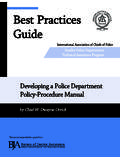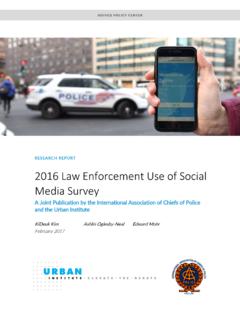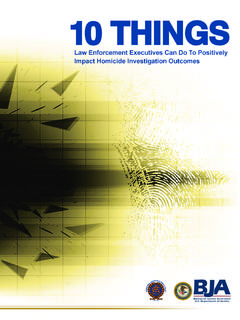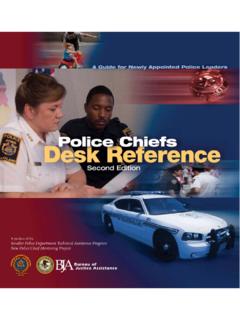Transcription of Employing Returning Combat Veterans as Law …
1 Employing Returning Combat Veterans as Law enforcement Officers recruitment strategies Current outreach strategies and marketing techniques for recruiting Combat Veterans 1. This project was supported by Grant No. 2009-D2-BX-K008 awarded by the Bureau of Justice Assistance. The Bureau of Justice Assistance is a component of the Office of Justice Programs, which also includes the Bureau of Justice Statistics, the National Institute of Justice, the Office of Juvenile Justice and Delinquency Prevention, and the Office for Victims of Crime. Points of view or opinions in this document are those of the author and do not necessarily represent the official positions or policies of the Department of Justice. April 2011. 2. strategies for Recruiting Combat Veterans I. Overview The Employing Returning Combat Veterans as Law enforcement Officers project team has assessed current outreach strategies and marketing techniques that law enforcement agencies use to market, recruit, and employ Returning Combat Veterans .
2 While some departments are successful in reaching out to Combat Veterans , others have not taken full advantage of modern marketing and recruiting tools, and have had limited success in recruiting servicemembers who have served in Iraq or Afghanistan. This document provides relevant background information and summarizes some particularly outstanding policies, recommendations, and recruitment strategies currently offered by law enforcement agencies, that, if adopted by others, will create a positive environment for recruiting and hiring Returning Combat Veterans . All of these strategies are designed to reach out to our country's patriotic Combat Veterans and provide them with the opportunity to serve their community through a career in law enforcement . II. Methodology Questionnaires and a request for recruiting materials were sent to a sample of 45 law enforcement agencies across the United States in an effort to identify best practices, standing orders, and challenges to recruiting Combat Veterans .
3 In all, 30 agencies contributed information to the research. Several excellent strategies and programs were identified, while also noting several areas of improvement and impediments to creating a successful strategy of welcoming Veterans into the law enforcement profession. We also viewed many local, state, and federal law enforcement agency websites in order to identify websites that employ innovative ideas to welcome and target Veterans . Additionally, we have attended a number of law enforcement job fairs in the Washington, metropolitan area to determine which law enforcement agencies are recruiting, who is utilized in the recruiting effort, and the types of materials displayed that might appeal to Veterans . III. strategies A. Agency Website Discussion: The face or identity of an organization is often represented through their website. Veterans will search a website for job postings, job descriptions, and information about incentives and support provided to Veterans .
4 Many agencies simply provide basic information about the application process but fail to include any text that focuses on Veterans or their families. strategies : Consider adding a separate webpage or section which will appeal to Veterans interested in law enforcement . Utilize marketing materials that will target military organizations in the Reserve components and those which indicate an 3. understanding of key veteran issues such as the Uniformed Services Employment and Reemployment Rights Act (USERRA) and Veteran Affairs (VA). Provide a direct link to IACP's Discover Policing which provides veteran policing opportunities. ( ). Establish an e-mail link so an agency officer with military experience can respond to questions from interested Veterans . Populate a FAQ section which provides answers to questions involving the application process, skills desired, education and/or GI Bill credits, agency vet 2.
5 Vet programs, and veteran incentives. Display pictures of sworn officer Veterans and indicate their Service affiliation. B. Attending Military Reception Events/Ceremonies Discussion: Law enforcement organizations pass up recruiting opportunities by not attending local military pre and post deployment activities. Despite few or no vacancies in a department, your agency could still reach out to interested Veterans , allowing them to take an examination, and be placed on a waiting list. strategies : Establish a presence at events such as airports, demobilization ceremonies, and homecoming celebrations that will highlight department support for units, individuals, and their families. Prepare marketing materials such as posters, pamphlets, and brochures that showcase your agency. If applicable, prepare a white paper or fact sheet which highlights individual contributions of nearby units which have citizen servicemembers on their active rosters.
6 C. Building Partnerships with Military Facilities/Organizations Discussion: A law enforcement organization will enhance visibility with Veterans by establishing a partnership or an affiliation with a local military base, Reserve center or Guard armory. In military towns or jurisdictions, this affiliation has existed for some time and should continue with involvement by a staff officer who has some military experience. The relationship should go beyond merely an opportunity to recruit Veterans , but could for example, offer crime prevention strategies , ride-along programs, and physical security surveys to family members. In some cases, departments can partner with specific units that are earmarked for an overseas deployment with a police support mission. strategies : Develop a relationship with a military base's transition office or career center. Services identify them differently, but they may be called the Navy Fleet and Family Support Center, the Army Community Service Center, the Marine Corps 4.
7 Community Services, the USAF Airman & Family Readiness Center, a US Coast Guard's Personnel Service Center, or a transition assistance office (generic). Develop a departmental display or fact sheet that provides marketing material for your agency and provide it to venues accessible to military personnel, both on and off base. Consider having a department recruiter available to respond to inquiries from interested Veterans . Volunteer to support presentations focused on transitioning military police or security force personnel. Partner with a base provost marshal or police chief to support them when feasible and permitted by law, and assist with information about future job openings. Identify the state Employer Support of the Guard and Reserve (ESGR) point of contact. Inquire about signing a Statement of Support.. Post employment information on a college or technical school campus where potential applicants may be working toward a degree in police science or criminal justice.
8 Offer to teach servicemembers subjects such as interrogation, investigative techniques, patrol, evidence collection, preservation, and handling. D. Educate Department/Recruiters Discussion: Returning Combat Veterans are provided information on many programs and services available to them during demobilization; these programs include health care, benefits, reemployment, and social services designed to ease the transition from deployment. The laws, provisions, and programs that supported servicemembers several years ago may be different from those in place today. As such, each department's management team needs to be familiar with basic laws and benefits available to Veterans as well as medical issues that could affect employment and reemployment. This understanding will go a long way to reducing stress and anxiety among Returning Veterans and their families. strategies : Conduct a training class and ensure department managers are familiar with the Uniformed Services Employment and Reemployment Rights Act (USERRA), and how Guard/Reserve members are protected with reinstatement in the position they would have likely achieved had they remained continuously employed (escalator position).
9 Ensure the department is familiar with the types of rehabilitation and outreach services provided by the military, so the department may incorporate selected services within their policies and procedures when permitted by local statute or law 5. Invite a health care professional to a training session to educate the department's management team on health concerns ( , Post Traumatic Stress (PTS), Post Traumatic Stress Disorder (PTSD), and Traumatic Brain Injury (TBI)) in addition to programs offered by local military health care facilities and Veteran Affairs (VA) medical center facilities Circulate the IACP guidebooks supporting law enforcement leaders and Returning Combat Veterans which explain veteran programs in detail. These guides are available at Reinforce with all current and future veteran applicants that the department is familiar with, understands, and supports Guard and Reserve obligations under the United States Code (USC).
10 E. Incentives Discussion: Departments have, in selected cases, gone the extra mile by providing compelling employment incentives. Departments that do not offer incentives may be losing out on recruiting highly skilled Veterans because other agencies promote better incentives or offer a more comprehensive deal. While it is understood that many departments have been forced to reduce budgets, any single or combination of incentives will let the veteran know that the department is fully supportive of Veterans joining their ranks. strategies : Departments could offer some of the following incentives to Returning Combat Veterans to entice them to join your department (ensure that any incentives conform to your local, state, or federal statutes, if applicable): Ten preference points added to oral interview score Five preference points added to exam score Ten preference points added to exam score for disabled Veterans Preference points, if not used for initial hire ( , high exam score), could be saved for a promotional exam College credit requirements could be waived or reduced ( , 30 college credit waiver with two years of military service).









